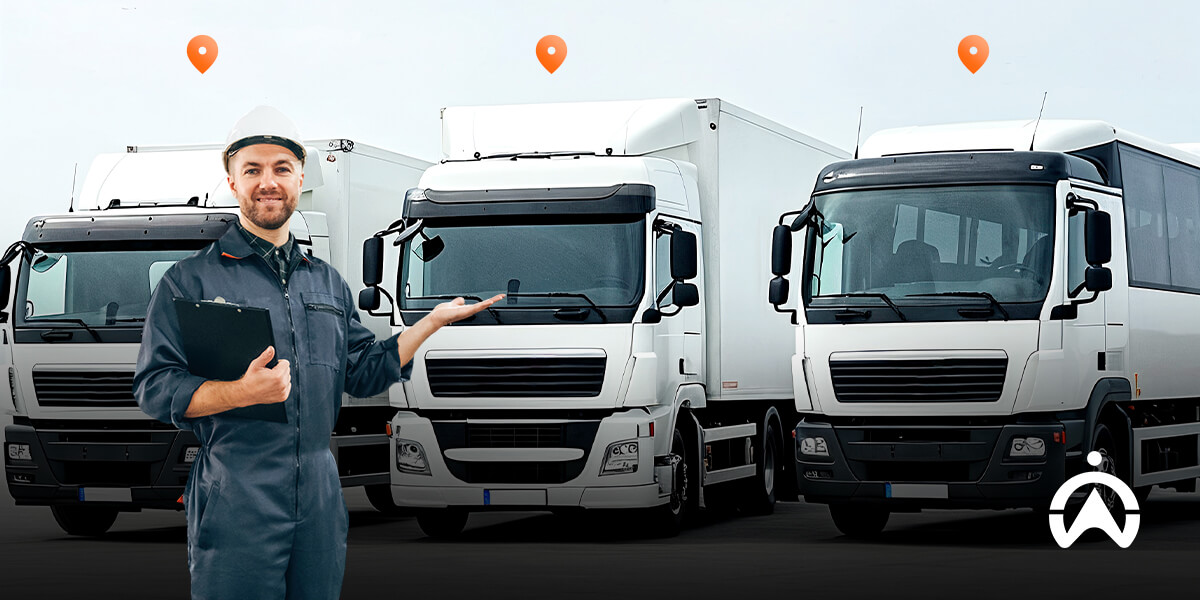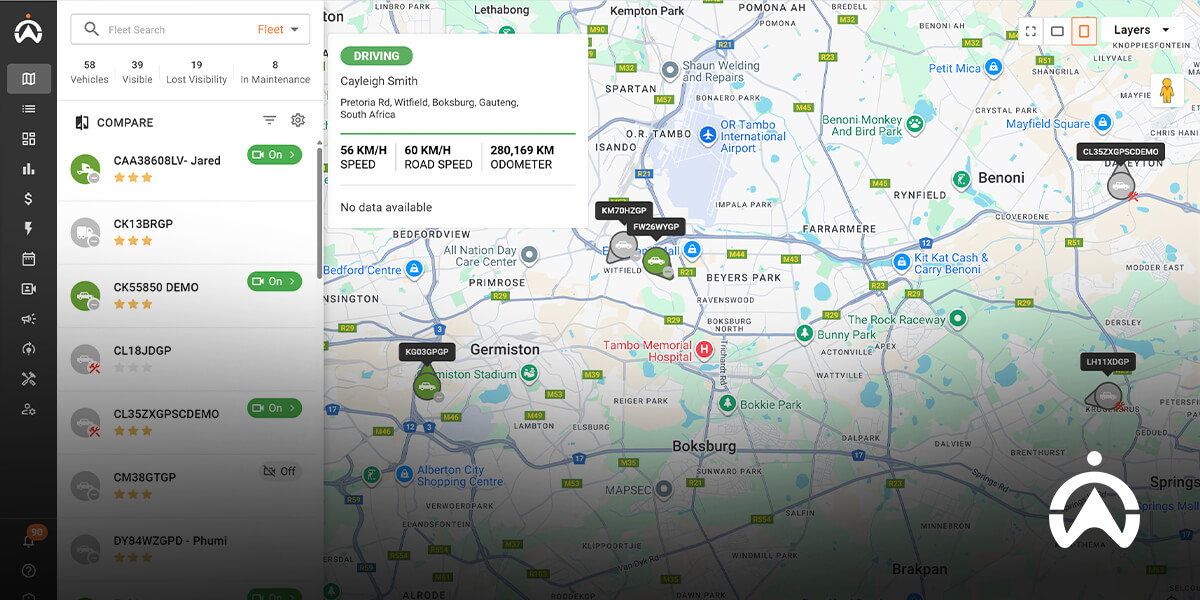What Is Fleet Tracking And How Can It Benefit Your Business?
Fleet tracking is the process of using a technology-based system to monitor the locations of vehicles, as well as their direction and speed. Fleet tracking is the combination of the global positioning system (GPS), telematics, and various other technologies. Together, these tools help you make smarter, data-driven decisions.
More companies in Eswatini are beginning to embrace smart fleet tracking tools to improve efficiency and safety. While South Africa leads the regional market, Eswatini’s transport and logistics sector is also seeing steady adoption of these technologies, often influenced by trends in neighboring countries. With providers like Cartrack — one of the largest fleet management solution providers in Southern Africa — businesses in Eswatini can access the same advanced tracking and management systems that are driving growth across the region.
Fleet tracking brings many benefits to businesses that want to improve their management of costs, drivers, and routes. In today’s article, we dive deeper into what fleet tracking comprises and why Cartrack should be your main source for fleet tracking services.
What is fleet tracking?
Fleet tracking refers to the practice of monitoring commercial vehicles using advanced software and hardware. These tools provide data on everything related to the vehicles. Fleet tracking systems share more than just a vehicle’s location. They can also monitor driver behaviour, fuel usage, and vehicle component health.
How it works:
Several components must be present for a fleet tracking system to function optimally. Mainly GPS, telematics, and some real-time data reporting capabilities. Here’s a brief breakdown of each component:
- GPS: The Global Positioning System (GPS) provides you with location data. This is done through the process of triangulation, which uses signals from at least three satellites to figure out exactly where your vehicles are. GPS is the foundation of fleet tracking, as it enables real-time visibility of each vehicle.
- Telematics systems: A telematics system is a structure that connects your devices with communication networks and software. The system collects and transmits GPS data from your vehicles using onboard diagnostics and cellular connectivity. Telematics technology gathers data such as speed, engine performance, and idling. Through this, you can monitor vehicle activity and driver performance effectively.
- Real-time data and reporting: For a fleet tracking system to deliver great results, it needs to be an active form of tracking. Active tracking refers to a system that has real-time monitoring capabilities. It provides ongoing location data and immediate updates to a central portal (such as a dashboard) for you to view.
Key features of fleet tracking systems
Let’s have a look at the features you should be looking for in a fleet tracking system, and why they matter:

The real impact of fleet tracking on your business
Fleet tracking serves many benefits to businesses. It gives you greater control over operations and resources, making your management more effective. Here’s how:
Improves safety
Monitoring how your drivers operate their vehicles encourages driver accountability, as they know they are being watched, which improves their behaviour. A change in risky driving habits helps reduce the chances of accidents. It also reduces the chances of possible lawsuits due to accident disputes.
Enhances productivity
Properly planned and optimised routes save time. Your drivers take fewer detours, spend less time stuck in traffic, avoid temporary road closures, and make it to delivery destinations on time. You’ll also have better scheduling and dispatching. This enhances the overall productivity of your drivers and improves the company’s reputation.
Reduces operational costs
Unhealthy driving habits, such as speeding and long idling, lead to higher fuel usage. They also put more strain on your vehicles, which causes them to degrade faster. As mentioned, they also increase the chances of road accidents, which means frequent insurance claims and repairs.
With a fleet tracking service, you get to save costs on all these aspects. The real-time monitoring of vehicles reduces fuel costs, vehicle wear & tear, as well as those frequent insurance claims, which may result in higher premiums. This reduces the overall costs of running your fleet.
Strengthens customer service
Route optimisation software also helps provide customers with accurate delivery time estimates. It improves response time to customer requests, because you’ll know exactly where drivers are. This strengthens your overall relationship with customers and improves ratings, which brings in more clients.
Aids compliance and accountability
As a fleet manager, you’re responsible for the lives of your drivers and the people they encounter on the road. You must ensure that all vehicles are roadworthy to ensure safety for your drivers and the public. You also need to ensure that drivers who work long hours have enough breaks in between stops. This ensures that your drivers don’t exceed the daily limit of allowed driving hours.
A fleet tracking system helps you maintain digital trip logs to monitor driver Hours of Service (HOS). It also gives you reminders of vehicle service days and alerts you to vehicle performance issues. These updates ensure that your fleet meets compliance and regulatory laws.
Which businesses can benefit from fleet tracking?
Fleet tracking technology benefits businesses in a wide range of industries. Here are some examples:
- Delivery and logistics companies: Businesses in this industry must have a fleet tracking system for efficient delivery operations. Vehicles that are on the road for long hours need close monitoring to ensure timely deliveries, good vehicle health, and less fuel consumption.
- Service-based businesses: Plumbers, electricians, and technicians are always on the move. Using a GPS fleet tracking system to monitor such field services ensures that you know where your plumbers or electricians are during their workday. It also enables efficient dispatch of the nearest technician for urgent calls, improving response times.
- Construction companies: In construction, the fleet not only consists of vehicles, but also equipment and machinery such as bulldozers and excavators. A fleet tracking system ensures the safety of those assets through location updates. It also ensures that they’re in good health.
- Mining companies: Just like the construction industry, mining companies also have a mix of heavy equipment and machinery. As such, a fleet tracking system ensures that all equipment remains within work zones and in good condition.
- Taxi, ride-hailing, and shuttle services: Businesses that are responsible for transporting people benefit immensely from fleet tracking systems. It reduces customer wait times and improves routing and scheduling.
- Any business with a vehicle fleet: A fleet tracking system can benefit any business that has company vehicles. For example, if you’re responsible for overseeing vehicle activities in a law firm, a fleet tracking system will make your job easier. You’ll know who took the company vehicle, where that person went, and if it was a business-related trip.
Fleet tracking made easy with Cartrack
Start transforming your fleet with smarter tracking tools. Our solutions give you real-time visibility of your vehicles, helping you monitor routes, improve efficiency, and ensure the safety of your assets and drivers. Here’s what we have to offer:
- Remote location tracking
See where all your vehicles are from anywhere with our GPS tracking services. With this, you get smart-map or satellite views of vehicles so you always know their movements. You can also replay trips and view driver behaviour reports to see how well vehicles are being operated. - Stolen Vehicle Recovery
In the unfortunate event that one of your vehicles is stolen, Cartrack offers a stolen vehicle recovery service. Our team of experts is available nationwide and always on standby, ready to take your call. With over 100,000 vehicle recoveries in the last decade on all vehicles connected to our platform, Cartrack will give you peace of mind so you can rest assured your vehicles are safe and secure. - Geofences
Ensure that vehicles and equipment remain in their stipulated zones. With our geofence feature, you can create virtual boundaries around areas of your choice. You’ll get alerts whenever vehicles enter or leave those boundaries, which might indicate route deviations or potential theft. - Driver Identification tag (DID)
Cartrack DID tags ensure that you instantly know who’s driving which vehicle or using which machine. If you have a mixed fleet comprising trucks, vans, and equipment of varying sizes, this feature is essential. Some employees might want to operate vehicles or machinery for which they aren’t licensed, which is a safety hazard. DID tags help prevent this from happening, as each person will have a tag that matches the vehicle they can operate.
- Digital logbook
The Cartrack logbook ensures that you closely monitor driver working hours as the logs are done automatically. It also ensures that the business remains tax compliant.

Cartrack – Your go-to fleet tracking service
Invest in our fleet tracking solutions to maximise your fleet and boost profits. At Cartrack, we always strive to give advanced tech solutions to simplify the management of fleet operations. Contact us for next-level fleet tracking services.
Frequently Asked Questions about fleet tracking
How do you run a successful fleet?
To run a successful fleet, you need to keep track of all your vehicles, plan routes well, and make sure drivers follow rules. Regular maintenance, checking fuel use, and using tools like GPS help keep vehicles safe and efficient. Good communication with drivers also helps the fleet work smoothly.
What is meant by ‘fleet’ in logistics?
In logistics, a fleet is a group of vehicles a company uses to move goods or transport people. This can include trucks, vans, or cars. A fleet helps businesses deliver products on time, manage large shipments, and operate efficiently. The size of a fleet depends on the company’s needs.
What is the difference between logistics and fleet management?
Logistics is about planning and moving goods from one place to another. Fleet management is about taking care of the vehicles that do the moving. Logistics focuses on delivery, storage, and timing, while fleet management focuses on vehicle maintenance, fuel, tracking, and driver safety. Both work together to run a smooth operation.


